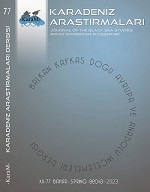GELİŞEN HİBRİT SAVAŞ ORTAMINDA NATO-AB İŞ BİRLİĞİ
NATO-EU COOPERATION IN THE EMERGING HYBRID WARFARE ENVIRONMENT
Author(s): H. Kutay Aytuğ, İ. Fatih PozanSubject(s): Security and defense, Military policy, EU-Approach / EU-Accession / EU-Development
Published by: Karadeniz Araştırmaları Merkezi
Keywords: Hybrid Warfare; The EU’s Response to Hybrid Threats; The EU-NATO Cooperation;
Summary/Abstract: Throughout the history of humanity, there has always been political, military, economic strife. That sometimes has turned into full-scale war. Advances in technology coupled with globalization changed who goes to war and how. Following World War II, the security environment in which states have been main actors have led to emergence of a hybrid warfare environment in which multiple actors (e.g. military units, terrorists, foreign fighters, organized crime units) are used to reach the goal faster, and for cheaper. In this study, we shall attempt to examine the effects of hybrid warfare on the cooperation between the European Union (EU) and NATO. First, we well talk about the phenomenon of hybrid warfare, followed by its historical background and the changes it has sparked – particularly in the case of Russia. Next, we will explore the EU's response to hybrid threats. Third, we will look cooperation and reports published by NATO and the EU on the matter. Our preliminary findings indicate that NATO and the EU are not alternatives of but rather complementary to one another in the ever-evolving hybrid war environment. Moreover, NATO it appears is a hard power against Russian threats, whilst the EU is a soft power.
Journal: Karadeniz Araştırmaları
- Issue Year: 2023
- Issue No: 77
- Page Range: 1-27
- Page Count: 27
- Language: Turkish

